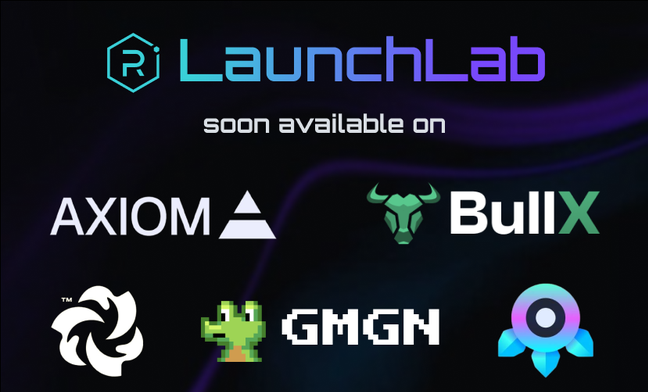Background: From Collaboration to Competition
As one of the largest decentralized exchanges (DEXs) on the Solana ecosystem, Raydium has long provided liquidity support for Pump.fun. With its “one-click token launch” and bonding curve mechanism, Pump.fun quickly became the most active meme token platform on Solana. However, in February 2025, Pump.fun announced the launch of its own DEX, PumpSwap, completely cutting ties with Raydium. This triggered a 29% single-day crash in the RAY token. In response, Raydium accelerated the launch of its own token issuance platform, LaunchLab, directly vying for control over the meme token market.

For investors looking to trade within the Solana ecosystem, JuCoin offers convenient trading tools and real-time market analysis.
Core Features of LaunchLab: Customization & Ecosystem Integration
Raydium’s LaunchLab doesn’t merely copy Pump.fun’s “fast food” token launch model but targets more complex market needs:
Two Launch Modes:
-
JustSendIt™: Aimed at regular users, offering a no-fee one-click token issuance. Once liquidity reaches 85 SOL (~$11,000), the token is automatically migrated to Raydium’s AMM pool.
-
LaunchLab Mode: Allows developers to customize bonding curves, token distribution rules, and transaction fee structures (up to 10% of revenue share for creators), suitable for more finely tuned projects.
Innovations in Liquidity Management:
After migration to the AMM pool, 50% of liquidity is permanently locked or burned. The remaining 50% of trading fees are used for community incentives, aiming to reduce rug-pull risks.
Cross-Chain Compatibility:
Supports migration of external assets from Ethereum, BNB Chain, and others into Solana, lowering the participation barrier for new users.
This strategy not only reinforces Raydium’s role as a foundational Solana protocol but also appeals to advanced developers. If you’re interested in cross-chain trading, refer to JuCoin’s Cross-Chain Asset Guide for more details.
Market Reaction & Intensified Competition
Since the March 2025 teaser release of LaunchLab, the RAY token price has risen over 30%, with trading volume up 60%, reflecting market optimism about Raydium’s transformation. But the battle is far from over:
-
Pump.fun’s Counterattack: PumpSwap recently introduced a “creator revenue share” feature, distributing 0.05% of protocol fees to token creators. It also added mainstream assets like cbBTC and APT to enhance liquidity.
-
User Experience Differences: Pump.fun attracts individual users with its minimalist interface, while LaunchLab’s advanced features may suit professional developers better. The two may split the market into “fast food memes” vs. “high-end projects.”
Long-Term Impact on the Solana Ecosystem
-
Liquidity Wars: The competition may fragment Solana’s liquidity in the short term, but could boost overall TVL (Total Value Locked) in the long run.
-
Meme Token Standard Differentiation: LaunchLab’s customization could lead to more utility-driven tokens, while Pump.fun continues to dominate community-driven meme culture.
-
Regulatory Risks: Should meme token chaos trigger regulatory scrutiny, Solana could face tighter oversight. Compliance could become the next battleground.
Future Trends: Platform Wars & Developer Tools
DEX competition on Solana is shifting from simple trading to full-stack service capabilities:
-
Fee Structure Optimization: Raydium uses 25% of platform revenue to buy back RAY tokens, while Pump.fun focuses on creator incentives—both exploring sustainable models.
-
Developer Ecosystem Building: Offering SDKs, analytics tools, and cross-chain support will be key to attracting projects.
-
Community Governance: DAO-style governance mechanisms like Uniswap’s may emerge, giving token holders a say in platform decisions.
This battle isn’t just about Raydium vs. Pump.fun—it could reshape the future of the Solana ecosystem. Investors should monitor on-chain data (TVL, token issuance volume) and regulatory trends to craft adaptive strategies.





